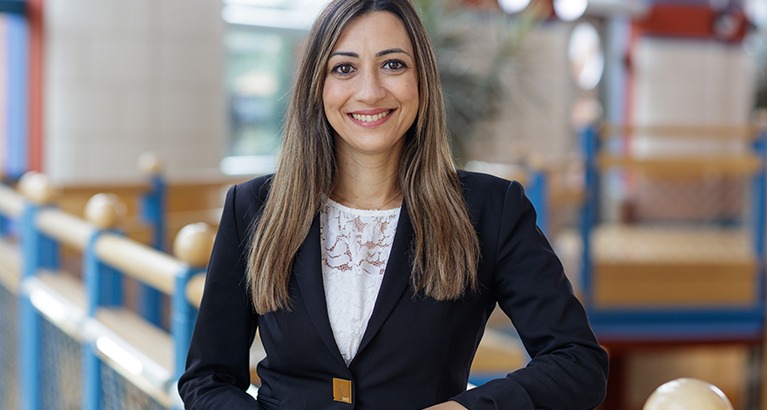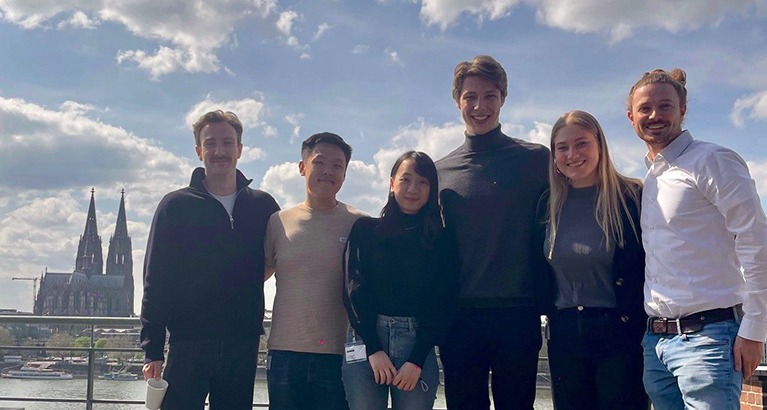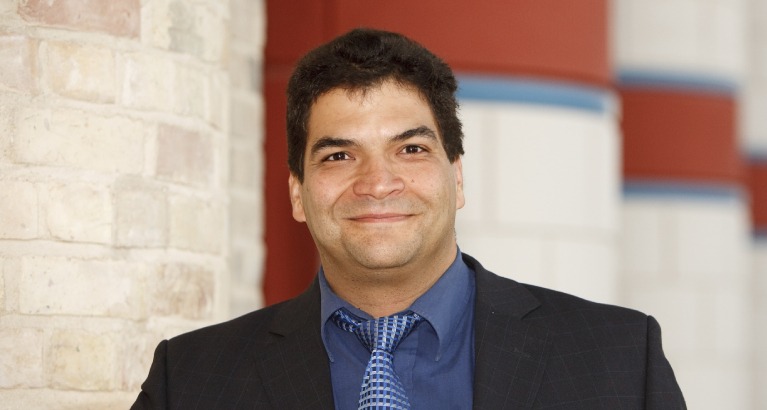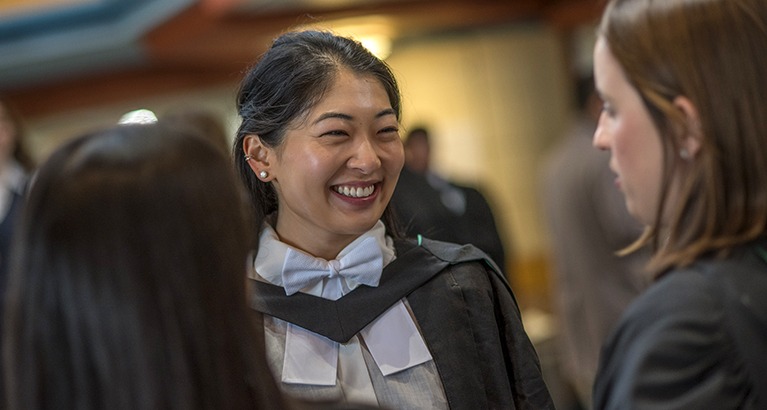“Until recently, knowledge workers and white-collar workers, in general, were perceived to be irreplaceable by machines. However, new digital tools – including LLMs (large language models) such as ChatGPT – are now automating many cognitive tasks,” says Dr Stella Pachidi, who joined Cambridge Judge Business School in 2015 and teaches Digital Business on the MBA programme.
“This raises several interesting questions for the future of work, such as: what types of knowledge tasks will still require humans, what new roles and occupations will arise, and how will manager-worker relationships change if decision-making is done by data-driven AI?
“These are some of the things I’ve been passionately researching recently,” says Pachidi. “If humans no longer have to do the routine, mundane tasks, how will they develop their expertise? And as LLMs take on community-driven Wikipedia, will the way we produce and consume knowledge change? I’m especially interested in how the emergence of new technologies changes the nature of work, and how organisations adapt their practices accordingly,” she says.
The journey to Cambridge Judge
Pachidi has long been passionate about these areas. “When I was in high school, I took an algorithm course and loved it,” she says.
That passion led her to study Electrical and Computer Engineering at the National Technical University of Athens, before pursuing a research master’s in business informatics at Utrecht University in the Netherlands.
As part of her master’s, Pachidi developed a data mining tool to analyse usage data collected from a SaaS application. “While the client liked my solution, they didn’t actually implement it,” she says. “That triggered my interest. I realised technology implementation is often impeded by more fundamental organisational challenges – these are more often about structure, processes, culture and people – so I wanted to spend more time trying to understand organisations.”
Feeling inspired, Pachidi took on a PhD in Information Systems at the Vrije Universiteit Amsterdam under the wing of Professor Marleen Huysman, Head of the Knowledge, Information and Innovation department.
It was during the final year of her PhD that Pachidi heard about a Lecturer vacancy at Cambridge Judge; she applied and got the position.
“I was over the moon!” she says. “After the Dean offered me the position, I called Marleen, my PhD advisor, and we were literally screaming through the phone for about a minute.”
Teaching on the MBA and the Business School community
Has her experience at Cambridge lived up to her expectations? “Without a doubt,” she says. “Every day, I walk to work thinking how lucky I am to work at this amazing place. My research group couldn’t have been a better intellectual home for me, we have an exceptionally collegiate environment, and we get the chance to teach some of the smartest and most motivated students in the world,” she says.
“What I also really love about Cambridge Judge Business School is the fact it feels like a big family – we’re encouraged to not only collaborate but also really care for one another, and that enables us to find ways to be creative and productive while also feeling happy and supported. I think it’s hard to find other business schools like that in the world, and I consider our work environment and culture a huge draw for our students too.”
Pachidi says Cambridge’s eco-system is also one of its key strengths. “There’s always something really cool going on: an interesting talk, a festival, an event,” she says. “The number of amazing ventures located next to and around the University also contribute to a truly intellectually stimulating environment.”
She’s also drawn by the style of teaching at the Business School – one that encourages independent thought through discussions, collaboration and practical projects. “We try to make our sessions highly interactive – we expect a lot from our students when it comes to preparation, but then we get to facilitate deep thinking discussions about how digital technologies are shaping how organisations create value,” she says.
“Our students have to develop their own solution for a digital challenge, and it’s highly rewarding to see how they take all these ideas and concepts from the class and apply them to a real solution.”
AI on the curriculum
When it comes to the MBA curriculum itself, it might come as little surprise that AI and other technologies are playing an ever-increasing role.
“A significant part of our Digital Business curriculum is dedicated to the integration of AI and other technologies in business that afford fundamentally new ways of creating, capturing and delivering value,” says Pachidi.
She believes this knowledge will be crucial to business leaders in the coming years. “No matter what role, business area or industry our MBA students choose to focus on, they will need to have at least a basic understanding of how they can help unleash the value of AI in their organisations,” she says.
“I also firmly believe it’s our responsibility to teach our MBAs about the ethical considerations they need to be aware of when they either adopt, develop, or implement these digital tools.
“Aside from that, every manager of the future needs to develop an understanding of the organisational transformations that come along with the introduction of these technologies, and how to manage them,” she says.
Women on the MBA
And what of women on the MBA and in the faculty? “Since I joined Cambridge Judge in September 2015, the Business School has been highly focused in increasing diversity overall and particularly improving women representation across faculty, staff, and students,” says Pachidi. “47% of last year’s (2022/23) cohort were female, and I’m happy to see better representation not only in numbers on the register, but also in voices in the classroom.”
She says the Business School has also implemented several initiatives to encourage women in business – including the Wo+Men’s Leadership Centre, established by the late Professor Sucheta Nadkarni.
“Sucheta felt passionate about supporting women’s careers and left a true legacy here,” says Pachidi. “She also implemented a great mentorship programme between senior female faculty members and junior women faculty and PhD students, which has been very successful.
“I think to see real, fundamental change around women in leadership, we need structural solutions, and UK-wide cultural changes to help women better balance professional and care duties,” she says. “But initiatives like those at Cambridge Judge Business School and the wider University are an inspiring step in the right direction, and I’m proud to be able to be part of the journey.”
Ongoing research
“Among my ongoing research is a look into the use of data to manage employee performance in the workplace. In particular, we are looking at how biometric data (heartrate, breathing and the like) reconfigures performance management in sports – but by extrapolation we believe that there are parallels with office work as well in certain circumstances.
“That’s because the relationship between athlete and coach requires very close collaboration, and there are similarities in other areas such as sales and financial trading in which workers and their managers are closely aligned in incentive and reward. I think there is a lot of scope for further research in this area, so this is an area where I hope to focus further in the future.
“Other research that I am currently working on includes the impact of Generative AI on the production of knowledge. We see that GenAI is perceived as double-edged sword by knowledge workers. On the one hand it can boost their productivity and release them from time-consuming mundane tasks; however, it also poses an existential threat to their expertise and the ways of knowing that they employ. This will have significant impact in the future for what counts as valuable knowledge or even what is truthful information.”
Teaches: Digital Business, Organising in the Age of Artificial Intelligence, Business Innovation in the Digital Age
Research interests: Technology and work, regimes of knowing, artificial intelligence, algorithms, data, organising for digital transformation, cross-boundary collaboration
Quirky fact: Boasted about being able to multi-task and ended up having twins





